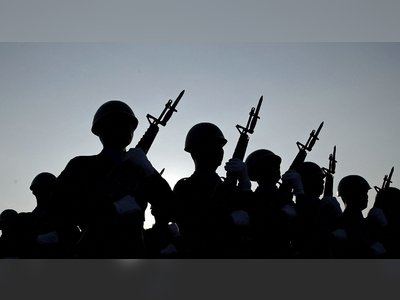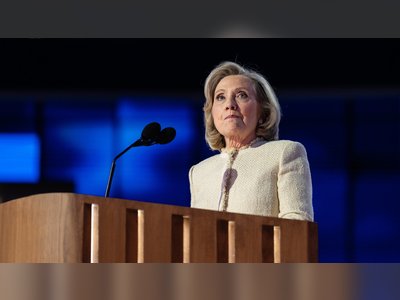
Gaza Ceasefire Negotiations Close In on Agreement Amid Intensified Talks
Final steps being discussed as negotiators seek to end hostilities and facilitate humanitarian aid in Gaza
DOHA/CAIRO/JERUSALEM, Jan 14 – In a decisive bid to end prolonged hostilities, negotiators convened in Qatar on Tuesday to finalize a ceasefire agreement in Gaza.
Descriptions from mediators and involved parties suggest that a resolution is closer than ever, although an outcome has yet to be publicly announced.
According to Majed Al-Ansari, a spokesperson for Qatar's foreign ministry, discussions have advanced to the stage of cementing final details after both factions received a proposed text.
US President Joe Biden expressed optimism, stating that the negotiations were approaching closure, with simultaneous participation from a delegate representing president-elect Donald Trump.
Sources from Hamas acknowledged that the negotiations have reached the concluding phase, with aspirations for a constructive resolution facilitated by Qatar, Egypt, and the United States.
Meanwhile, an Israeli official indicated that while critical components remain under discussion, the sides are nearing a comprehensive ceasefire: 'We are close, we are not there yet.'
Adding to the complex dynamics, Islamic Jihad, a militant group distinguishable from Hamas and also a holder of hostages in Gaza, announced it was dispatching a senior delegation to Doha late Tuesday to contribute to the concluding stages of the agreement.
US President Joe Biden highlighted the significance of the potential deal: 'The deal ...
would free the hostages, halt the fighting, provide security to Israel and allow us to significantly surge humanitarian assistance to the Palestinians who suffered terribly in this war that Hamas started.'
Should these negotiations succeed, the incremental ceasefire—capping over a year of on-and-off discussions—could halt the relentless conflict that has wreaked havoc on Gaza, leading to tens of thousands of Palestinian deaths, pervasive homelessness, and ongoing fatalities.
Such a ceasefire carries the potential to reduce rising tensions throughout the Middle East, where the war has ignited strife in regions including the West Bank, Lebanon, Syria, Yemen, and Iraq, and has escalated fears of a broader confrontation between Israel and Iran.
Under the prospective agreement, Israel stands to recover around 100 hostages and the remains of individuals captured during the October 7, 2023 attacks initiated by Hamas.
In exchange, Israel would release Palestinian detainees.
In Washington, US Secretary of State Antony Blinken discussed prospective governance for Palestinian territories post-conflict, stating the onus is on Hamas to accept the prearranged deal.
Hostage families in Israel oscillate between cautious optimism and apprehension.
Meirav Leshem Gonen, whose daughter Romi was abducted from a music festival, shared on Radio 103, 'We have to keep our feet on the ground.
But on the other hand our heads are in the clouds.'
An Israeli source specified that the initial phase of the deal would involve the liberation of 33 hostages, including women, children, men over 50, and the infirm.
Israel's military presence is also expected to be partially retracted in this phase.
A Palestinian source mentioned that Israel would reciprocate by releasing 1,000 Palestinian prisoners over the initial 60 days.
Families with loved ones not slated for immediate release remain on edge.
While Prime Minister Benjamin Netanyahu engaged with some hostage families, others continue to press for broader inclusion in the deal's terms.
'We need a deal that includes all the hostages, including my son,' asserted Ruby Chen, whose son Itay's body remains in Gaza following the October 7 events.
FIGHTING STILL RAGES
Israel’s military campaign in Gaza followed Hamas-led incursions on October 7, 2023, which claimed 1,200 Israeli lives and resulted in over 250 hostages.
Since then, Israeli military efforts are reported to have resulted in more than 46,000 Palestinian deaths as tallied by Palestinian health officials.
To date, the only ceasefire achieved was a brief, one-week pause in November 2023, during which approximately half of the hostages were exchanged for Palestinian detainees.
Both factions maintain theoretical consensus on a ceasefire premise coupled with a detainee swap, yet previous negotiations have unraveled over subsequent stipulations, with Hamas demanding a lasting cessation, while Israel insists on Hamas's dismantlement prior to the end of hostilities.
As battle rages, primarily in northern Gaza—where Israeli forces aim to deter Hamas resurgence, according to Israeli authorities, and from where Palestinians claim a strategic depopulation is being executed—aerial bombardment has persisted.
Gaza health officials reported at least 27 Palestinian fatalities from Israeli airstrikes on Tuesday, among them a journalist.
Separate incidents accounted for numerous deaths, including an airstrike that claimed 10 lives in Khan Younis and another that killed nine in a central Gaza refugee camp.
With Trump’s January 20 inauguration approaching, a clear ceasefire deadline seems implicit.
Both Trump and Biden have emphasized urgency in securing a resolution before the transition of power in Washington.
Descriptions from mediators and involved parties suggest that a resolution is closer than ever, although an outcome has yet to be publicly announced.
According to Majed Al-Ansari, a spokesperson for Qatar's foreign ministry, discussions have advanced to the stage of cementing final details after both factions received a proposed text.
US President Joe Biden expressed optimism, stating that the negotiations were approaching closure, with simultaneous participation from a delegate representing president-elect Donald Trump.
Sources from Hamas acknowledged that the negotiations have reached the concluding phase, with aspirations for a constructive resolution facilitated by Qatar, Egypt, and the United States.
Meanwhile, an Israeli official indicated that while critical components remain under discussion, the sides are nearing a comprehensive ceasefire: 'We are close, we are not there yet.'
Adding to the complex dynamics, Islamic Jihad, a militant group distinguishable from Hamas and also a holder of hostages in Gaza, announced it was dispatching a senior delegation to Doha late Tuesday to contribute to the concluding stages of the agreement.
US President Joe Biden highlighted the significance of the potential deal: 'The deal ...
would free the hostages, halt the fighting, provide security to Israel and allow us to significantly surge humanitarian assistance to the Palestinians who suffered terribly in this war that Hamas started.'
Should these negotiations succeed, the incremental ceasefire—capping over a year of on-and-off discussions—could halt the relentless conflict that has wreaked havoc on Gaza, leading to tens of thousands of Palestinian deaths, pervasive homelessness, and ongoing fatalities.
Such a ceasefire carries the potential to reduce rising tensions throughout the Middle East, where the war has ignited strife in regions including the West Bank, Lebanon, Syria, Yemen, and Iraq, and has escalated fears of a broader confrontation between Israel and Iran.
Under the prospective agreement, Israel stands to recover around 100 hostages and the remains of individuals captured during the October 7, 2023 attacks initiated by Hamas.
In exchange, Israel would release Palestinian detainees.
In Washington, US Secretary of State Antony Blinken discussed prospective governance for Palestinian territories post-conflict, stating the onus is on Hamas to accept the prearranged deal.
Hostage families in Israel oscillate between cautious optimism and apprehension.
Meirav Leshem Gonen, whose daughter Romi was abducted from a music festival, shared on Radio 103, 'We have to keep our feet on the ground.
But on the other hand our heads are in the clouds.'
An Israeli source specified that the initial phase of the deal would involve the liberation of 33 hostages, including women, children, men over 50, and the infirm.
Israel's military presence is also expected to be partially retracted in this phase.
A Palestinian source mentioned that Israel would reciprocate by releasing 1,000 Palestinian prisoners over the initial 60 days.
Families with loved ones not slated for immediate release remain on edge.
While Prime Minister Benjamin Netanyahu engaged with some hostage families, others continue to press for broader inclusion in the deal's terms.
'We need a deal that includes all the hostages, including my son,' asserted Ruby Chen, whose son Itay's body remains in Gaza following the October 7 events.
FIGHTING STILL RAGES
Israel’s military campaign in Gaza followed Hamas-led incursions on October 7, 2023, which claimed 1,200 Israeli lives and resulted in over 250 hostages.
Since then, Israeli military efforts are reported to have resulted in more than 46,000 Palestinian deaths as tallied by Palestinian health officials.
To date, the only ceasefire achieved was a brief, one-week pause in November 2023, during which approximately half of the hostages were exchanged for Palestinian detainees.
Both factions maintain theoretical consensus on a ceasefire premise coupled with a detainee swap, yet previous negotiations have unraveled over subsequent stipulations, with Hamas demanding a lasting cessation, while Israel insists on Hamas's dismantlement prior to the end of hostilities.
As battle rages, primarily in northern Gaza—where Israeli forces aim to deter Hamas resurgence, according to Israeli authorities, and from where Palestinians claim a strategic depopulation is being executed—aerial bombardment has persisted.
Gaza health officials reported at least 27 Palestinian fatalities from Israeli airstrikes on Tuesday, among them a journalist.
Separate incidents accounted for numerous deaths, including an airstrike that claimed 10 lives in Khan Younis and another that killed nine in a central Gaza refugee camp.
With Trump’s January 20 inauguration approaching, a clear ceasefire deadline seems implicit.
Both Trump and Biden have emphasized urgency in securing a resolution before the transition of power in Washington.











